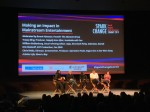Social justice entertainment may carry a lesson, but it’s far from homework.
The creation, reception and impact of social change films formed the focus of one panel discussion at the second annual Spark Change Summit, which took place in UCLA’s James Bridges Theater on Friday. Presented by the Skoll Center for Social Impact Entertainment, the event featured a total of five panels, with prominent industry figures such as “The Office” star Rainn Wilson, who founded digital entertainment company SoulPancake, and Amy Ziering, an Emmy Award-winning producer of “The Bleeding Edge.”
Devon Dansky, project coordinator for the Skoll Center, said this year’s summit focused on specific issues rather than broad social justice entertainment like last year’s. Topics included mobilizing audiences online and the role of technology in the next generation of filmmaking, among others.
Though it has existed for years, social justice entertainment is only now gaining popularity, said Laura Herb, the center’s program manager. Such entertainment doesn’t have to feel like homework, she said – even a lighthearted and enjoyable children’s movie such as “Zootopia” has a clear message of tolerance and diversity.
“There can be many formats (of social justice entertainment); it’s anything from ‘An Inconvenient Truth’ to ‘Will and Grace,'” Herb said. “People are just very conscious of the effect that media has and what you can do with it, and they really seem to want to use it for good.”
Bonnie Abaunza, founder of human rights organization Abaunza Group, moderated the panel centered on making an impact in mainstream entertainment. She first asked how the panelists walked the line between simply depicting social issues in their films, and making their work a full-fledged “message movie.”
[RELATED: Alumna seeks social justice through film, owns charitable wine company]
Erin Siminoff, the executive vice president of production of Fox 2000, said she aims to portray social justice issues, such as LGBTQ rights, in a way that draws people to the theater and makes audiences feel like they are part of a larger conversation. She said audiences don’t like to be pandered to, and movies that portray firsts – like a first love in “Love, Simon,” – tend to be more impactful. Even though a film may tackle specific issues, popular appeal is necessary in establishing a platform large enough to change audience’s perspectives and have a wider impact, said Chris Weitz, a director, producer and screenwriter who has worked on titles including “Rogue One: A Star Wars Story.”
“You get to get hold of someone’s waking consciousness for two hours and get them to empathize with someone they might have just thought of as a statistic before,” Weitz said.
Addressing the same topic, William Goldenberg said a film’s platform, in addition to its content, is important in conveying its message – the Oscar-winning editor has previously worked on war films including “Argo” and “Zero Dark Thirty.” Goldberg cited the example of “22 July,” which details a terrorist attack in Norway; the film’s director originally wanted to show his work in an exclusive, artistic setting, but was convinced to release it on Netflix. As a result, millions of viewers have been exposed to the dangers of the “alt-right” and gun violence.
Abaunza also asked the panelists about the often mixed receptions of socially conscious films. Although there was a successful marketing campaign for “Love, Simon” – including billboards customized for different cities – Siminoff said she was still worried about its reception in more conservative areas. However, she said she would never forget the moment when theater audiences in Kansas stood up and cheered as the protagonist and his male love interest shared a kiss on screen.
“It felt like the movie was really needed in that area,” Siminoff said. “Movies help people connect to things that are in their own lives, or give them insight into something they aren’t familiar with.”
[RELATED: Ryan Gosling joins panel discussion on Congolese resistance to Western exploitation]
Several panelists said the choice to infuse social justice into their films stemmed from a deeply personal place. Weitz said he felt personally connected to the issue of immigration because his father was a German refugee and his grandmother a Mexican immigrant. It was important for him to represent the immigrant experience accurately in “A Better Life,” he said. Meanwhile, having grown up only seeing a handful of characters who looked like her, “Nappily Ever After” producer Tracey Bing was inspired by the film’s script and the way it represented black women. Ultimately, Bing said the film struck a chord with the natural hair movement, which represents African pride as well.
“Women around the world really related to appearance pressure,” Bing said. “It was for a target audience, but appealed much more broadly.”
All panelists agreed that any film, not just documentaries, can be a powerful medium to give an audience insight into the lives of people who do not share their own experience. Weitz said every form of entertainment has a social impact, yet many are often overlooked because their message only reinforces the status quo. This status quo, however, can be changed when filmmakers and audiences alike step up to share their stories, Ziering said.
“We’re now living through a revolution that’s being fought with words and not weapons,” Ziering said. “It’s remarkable what one movie can do.”
